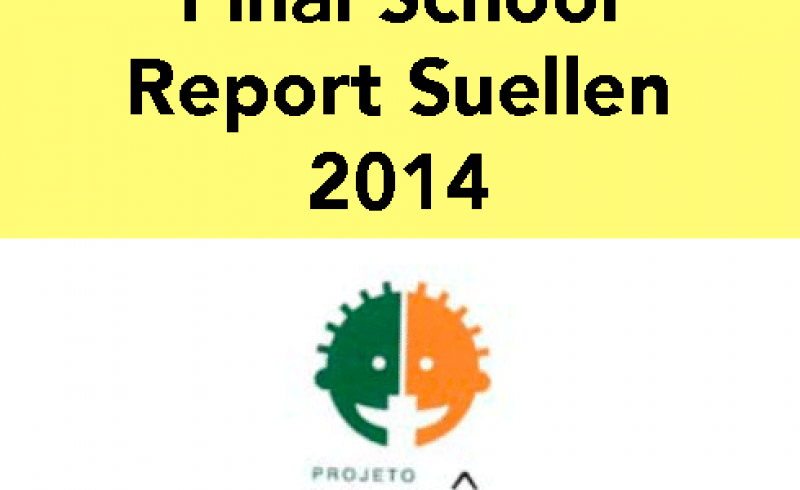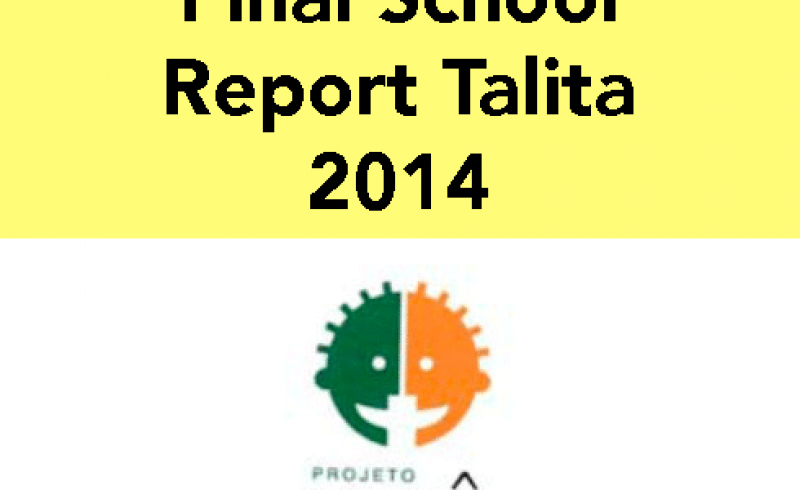Annual Report 2014
(Excerpt: For the complete report please write to Epona-Stiftung für Pferd und Umwelt c/o Mermagen, Kesselstr. 15, 53797 Lohmar)
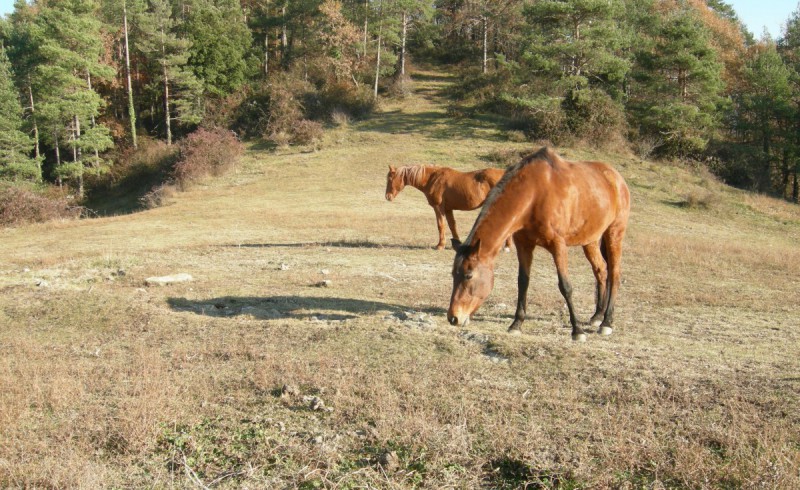
In the year of the horse (according to the Chinese horoscope) there were big changes for all of us – the four and the two legged members of the Epona Foundation. We have moved from the sprawling green pastures of Normandy into the Spanish mountains. We found a new home on the farm ‘La Casa Nova’ nearby Sora, north of Barcelona in the Pyrenean foothills in Catalunia. We had to move because La Chevrie was sold. The new owner is an important French animal protection organization (Societe Protectrice Animaux SPA).
The new surroundings
Apart from the initial conversion difficulties, the change had many positive effects for our horses:
- Finally we were able to bring the two Moroccan berber mares Aloha and Indu into the Epona family. We had left them in Andalusia, because the rich grass and the wet climate of Normandy was not appropriate for these desert horses.
- Also the other Epona horses, especially the older ones and those with Spanish blood, gained from their new home with its barren mountainsides where they have to search their fodder. Jumpies and Ellas sweet itch got much better and Valentina got completly rid of it. All horses became slimmer and more muscular.
- The area of Sora is known as a training region for endurance horses. That’s why you find the best veterinarians and blacksmiths there. Kosmos’ severe ophthalmitis was healed in a clinic near Barcelona.
- Jumpy, our problem child (see annual report 2013), found his master in Toni. With the Indian method ‘Doma India’ he turned the stubborn, aggressive and anxious gelding into an endearing and pleasant horse.
Mercè, the owner of the farm takes care of more than 40 horses who live as a herd on vast pastures with various vegetation and natural water resources. The horses should live as indepandantly as possible including searching their own fodder. If necessary they get some extra food. Since Mercè and the Epona-Foundation share the same philosophy we decided to move to her place. Moreover Mercè had studied veterinary medicine and had worked at a horse clinic in Dubai.
Medical Care
At the end of the year the horse dentiste Matilde Duch came in and treated all our horses and ponies. She is an expert especially for older horses and so she found out that Brill had lost almost all his grinders and therefore was not able to chew roughage. We changed his food to steeped hay-pellets. When his head first dived into the huge feeding trough and we only heared him munching with relish we knew what he was missing. When he finally turned up again his muzzle and nose covered with green puree he looked at us as to say: “Finally you’ve found out what I was missing.” Indu suffered from a sored grinder which was pulled out by Matilde. Afterwards the little Berber mare felt much better.
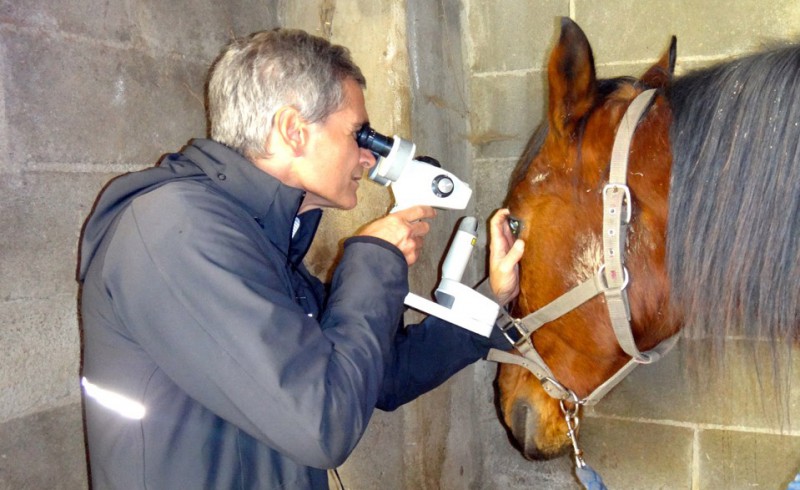
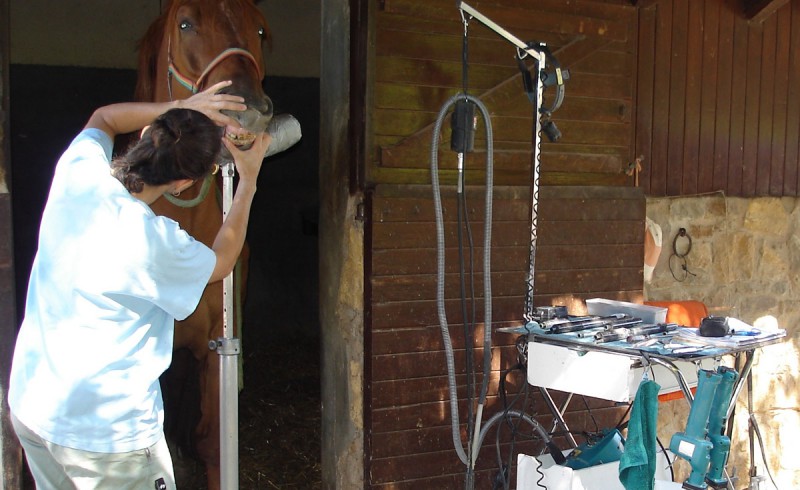
As you can see we had to pay heavy bills for veterinarians last year but the results justified these expenses. Especially Kosmos turned into a different horse after his stem cell therapy. He now joyfully and trustingly looks at us through his healthy and beautiful eyes. We have to thank especially Mercè who took care for this rather sensitive and aruous gelding in a very touching manner. With endless patience she trickled the medicine in his eyes and so shortened his time in the clinic.
A cry for help from Germany
As if we didn’t have enough work with our own horses an email arrived us in November the 3rd:
“Dear Members of the Epona Foundation,
my name is Luisa Zielke and I apply to you out of sheer desperation. We are a group of young women (and all of us own horses) who have bought a four year old mare three month ago. The horse suffered from a massive proliferation in her right eye and her former owner wanted to slaughter her, but only after the profits for horse meat would have risen again. Through a public appeal we managed to gather enough money for a surgery. In the clinic Denim they eye had to be completly removed. The mare had to stay there for about four weeks. But shortly after she had left the clinic her left eye began to swell. We started a second appeal and let her being examined by the eye specialist Dr. Toth from Dülmen, Germany. He came up with the diagnosis that the mare has an inner inflammation in her left eye. There is urgent need for action because without medical treatment this inflammation will let the mare go blind. So she would loose here second eye too and this would be the end. To save the eye another surgery is necessary. We have spent already about 2.000 € to save the mare and we cannot gain the 1.500 € for the new surgery. We desperately need more financial support. If we fail all the former help would have been useless.
Do you have any fortune to support us? The veterinarians Dr. Anders, Dr. May and Dr. Toth are willing to answer your questions.
Yours sincerely,
Luisa Zielke
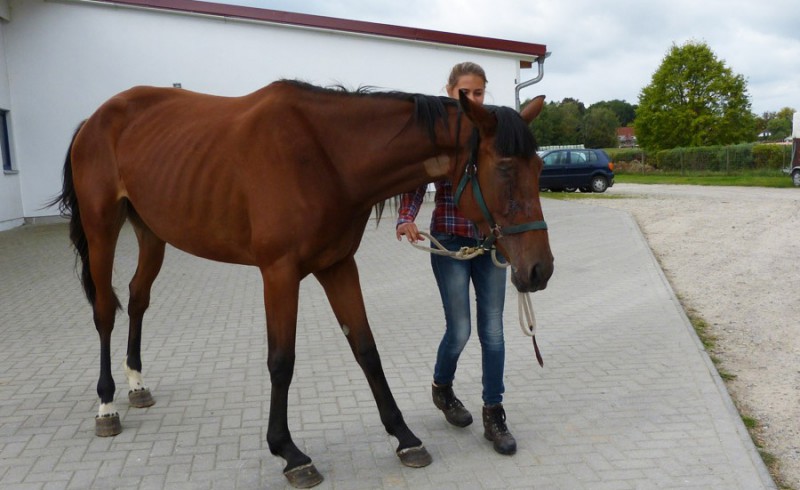
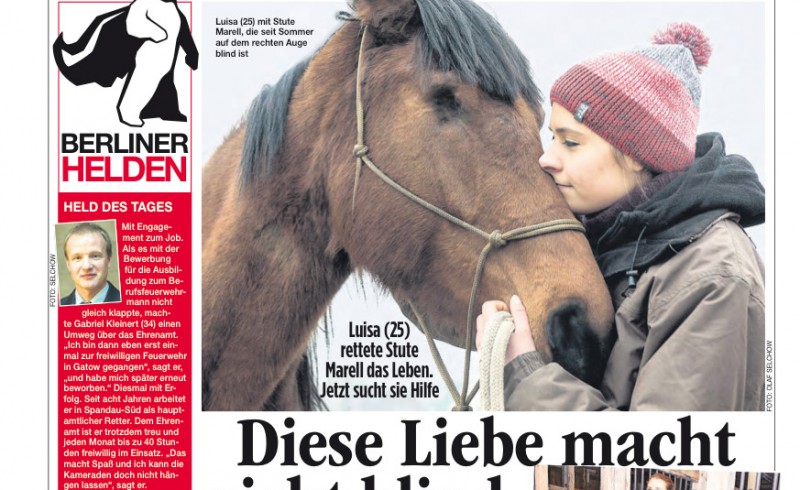
Without much hesitation we were willing to help for a change. Subsequently we became witnesses of the exceptional and affectionate commitment of a young woman, who did all she could to help an ill and poor horse. And she succeeded. Today Marell is a beauty of a mare and her young owners are rightly proud of her.
Toni and Jumpy
Another cause for celebration is the development of our problem child Jumpy. The gelding who joined the foundation in 2013 (see annual report 2013) developed exellently. Since we can treat his summer allergy now his fur had grown again. And now we can touch him without having to worry about a straight kick, he even enjoys strokes. Toni who was essentially involved in the metamorphosis of this little ‘beast’, embodies all the attributes that are necessary to work with difficult horses. He is patient, sympathetic, humorous and as a former dancer, he is fast, agile and strong.
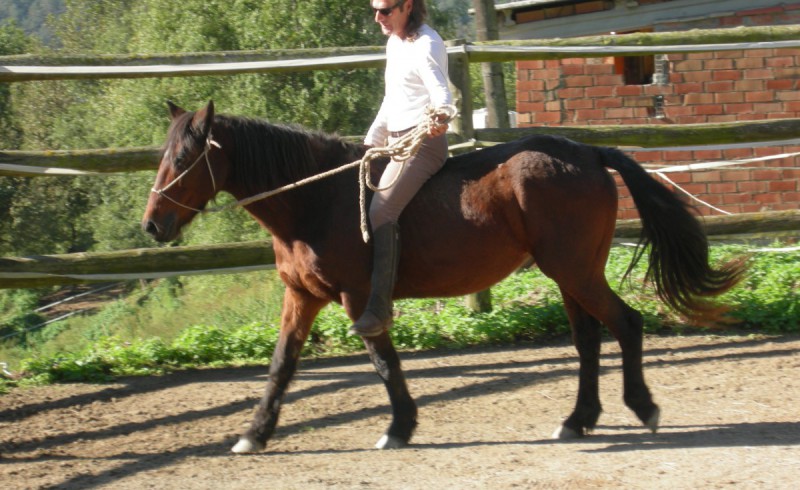
Toni Arnal Roig, born in Barcelona in 1965 loves horses since his childhood. In the past he practiced different riding and dressage methods and took part in courses of Lucy Rees and Chico Ramirez. But only when he came across Oscar Scarpati and his method ‘Doma India’ in Argentina in 2000, he started an apprenticeship after which he completly devoted himself to work with horses. At the beginning it was difficult to find people to let him work with their horses because the ‘Doma India’ wasn’t known in Europe. So he was only allowed to work with the most difficult horses who where all already abandoned by others. So little by little he specialized on problematic horses. Altough he nowadays works with all kind of horses, but the work with these special ones like Jumpy he likes the most.
Interview with Toni Arnal Roig
Can you describe the method ‘Doma India’?
The ‘Doma India’ is being practiced since the 17th century by the Ranquel Indians who live in the Argentinian Pampa to tame horses. Without outer influences, only with the knowledge and the respect to nature, they developed their very own way to understand and to train horses with much resprect for their nature.
How does this work differ from the ‘Doma Natural’?
In opposite to the traditional Doma Natural which is based on behaviorism and the study of the way horses express themselves the basis of the Doma India is love and trust. Each horse is treated as an exceptional being, his virtues and capabilities are emphazised and his lacks and flaws are compensated, as if the horse is a son or a brother.
In 2000 I had the great luck to meet Oscar Scarpati and his family. They are direct ancestors of the Ranquel Indians and they have devoted their life to horses. Oscar Scarpati and his family founded the School ‘Doma India Argentina’ to spread the knowledge of their tribe.
After I had spent some time with them I completly changed my life. Not only did I learn about horses but about life in general, the way Indians understand it. Indians say: ‘The domestication of a horse comes off through the window of the horses soul.’ And I experienced that if a horse opens the door to her soul she commits you the key to your life. Ever since I worked with hundreds of horses. Each one of them different and unique and with all of them I shared my experience and learned from them.
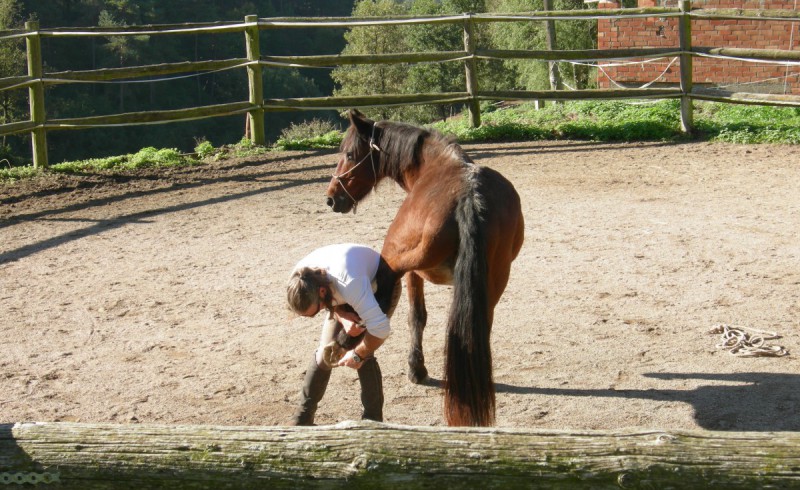
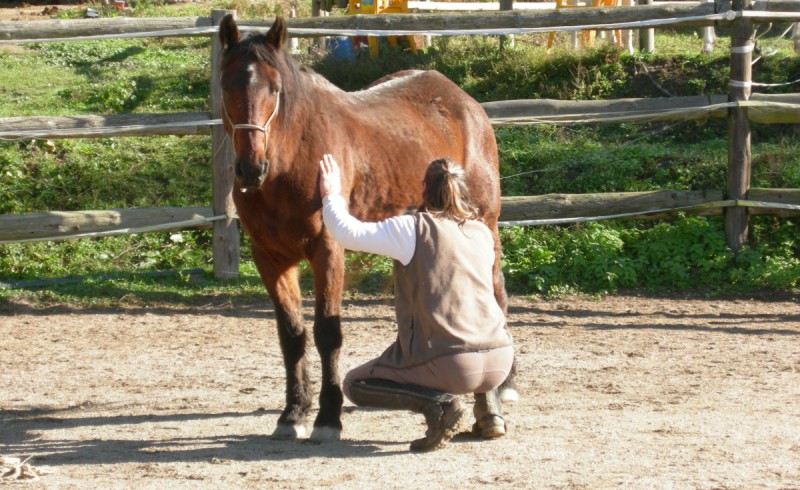
What was the first impression you got from Jumpy?
When I was asked to look after Jumpy and I was told his story, I did believe that he was again a mistreated horse: a fourteen year old horse, who spent almost ten years of his life among a herd of cows and therefore biting, kicking and not willing to be touched.
How did you work with Jumpy? What was the most important? What did surprise you?
I watched him carefully, he really gave a pitiable sight because of his dull fur and his sweet itch At his widest and his back wasn’t much fur left, crest and tail had been rubbed off.
I went into the stables and concentrated on his sight. There was neither hate nor fear in his eyes but a kind of astonishment. Carefully I began to work with him, got him out of his box and recognized that he behaved more like a cow than a horse without respect for anyone. Gradually I realized that Jumpy understood nothing. After all these years amongst cows he had found out to get along with them, but not with humans. I assumed that he wanted to earn respect with all his biting and kicking. And the fact that he did not wanted to be touched, his fear and his suspicion was the result of his painful sores. I decided to play with him and touched him with a rope to show that I wasn’t afraid of him and that being touched does not inevitably means pain.
The crucial and difficult point was to gain his trust. After I had accomplished that task after many hours Jumpy changed his aggressive behavior. At this point I could touch him, put on some lotion on his sores and cut his hooves. So we could help him. But what me surprised the most was that he did not loose his states of anxiety. He could not stand still when somebody came close to him.
Many hours and many trips into the sourroundings were necessary to convince him that he could peacefully graze in my presence. Prolonged stroking and steady attention finally made it possible that Jumpy not only likes trips but even lets me mount him.
What do you think about Jumpy today?
His recuperation is not finished yet. The bad memories as well as the goog ones never die out completly. But he is on his way to become a quite normal horse, with a difficult character indeed, but without aggression and very sensitive in company. His appearance improved very much and his sores are only memories, white spots in his fur.
What can we learn from horses?
From Jumpy I learned that a lack of understanding may lead to aggression. To stop this from happening I need to speak a language everybody understands: the language of honesty, love and trust.
The Uerê project
The Uerê godchildren with good grades
At the end of the year Annie Hasemanns, International Program Adviser Uerê wrote us a letter:
Here come the grades of Talita and Suellen. Both girls did well and moved up to the next level. Suellen wants to visit a private school to start her three year secundary education. I want to ask if the Foundation is fine with that and is able to keep the scholarship. Costs will increase slightly form 1600 € to 1700 €. As Brasil gets more and more expensive so do the schools. Already last year Uerê did not have enough money. Alternativly I could start searching for another sponsor to help compensating the missing amount.
By now the children are on holidays and the next school year will start at the beginning of February. Last August I was very pleased by the peaceful atmosphere in Complexo da Maré, but this did not last for long. Despite the presence of the brazilian army armed conflicts are taking place. It is much to be hoped that till the Olympic games in 2016 a lasting solution will be found, so the people can finally live in peace.
See you around,
Annie Hasemanns
